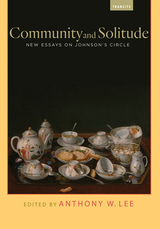
Contributors: Christopher Catanese, James Caudle, Marilyn Francus, Christine Jackson-Holzberg, Claudia Thomas Kairoff, Elizabeth Lambert, Anthony W. Lee, James E. May, John Radner, and Lance Wilcox.
Published by Bucknell University Press. Distributed worldwide by Rutgers University Press.
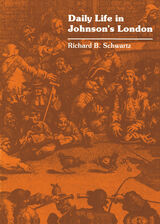
"Outstanding. . . . The author packs a remarkable quantity of detail into a small space, even including a discussion of price and wage figures that will be intelligible to Americans [today]. . . . His prose is lucid, graceful, lively. Generously illustrated, the book also includes an extensive bibliography."—Choice
"An excellent source for English Literature and history students studying this period or Samuel Johnson."—Booklist


Published in the bicentennial year of Samuel Johnson’s death, Johnson and His Age includes contributions by some of the nation’s most eminent scholars of eighteenth-century literature. A section on Johnson’s life and thought presents fresh analyses of Johnson’s friendships with Mrs. Thrale and George Steevens, new information on Johnson’s relations with Smollett and Thomas Hollis, a speculative essay on “Johnson and the Meaning of Life,” and a provocative examination of “Johnson, Traveling Companion, in Fancy and Fact.”
Other essays reinterpret basic assumptions in Johnson’s criticism and examine “The Antinomy of Style” in Augustan poetics, Hume’s critique of criticism, and the broad Anglo-Scots inquiry on subjectivity in literature. A section on major figures of the age discusses Gray and the problems of literary transmissions, Hogarth’s book illustrations for friends, Gibbon’s oratorical “silences,” Blake’s concept of God, and Burke’s attempt to forestall Britain’s ruinous policy toward the American colonies. A section on the novel examines that genre from Richardson and Sterne to Austen.
Among the contributors are Bertrand H. Bronson, Jean H. Hagstrum, Patricia Meyer Spacks, Robert Haisband, Howard D. Weinbrot, Mary Hyde, Ralph W. Rader, Lawrence Lipking, Gwin J. Kolb, John H. Middendorf, W. B. Carruichan, and Max Byrd.
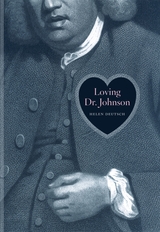
Loving Dr. Johnson uses the enormous popularity of Johnson to understand a singular case of author love and to reflect upon what the love of authors has to do with the love of literature. Helen Deutsch's work is driven by several impulses, among them her affection for both Johnson's work and Boswell's biography of him, and her own distance from the largely male tradition of Johnsonian criticism—a tradition to which she remains indebted and to which Loving Dr. Johnson is ultimately an homage. Limning sharply Johnson's capacious oeuvre, Deutsch's study is also the first of its kind to examine the practices and rituals of Johnsonian societies around the world, wherein Johnson's literary work is now dwarfed by the figure of the writer himself.
An absorbing look at one iconic author and his afterlives, Loving Dr. Johnson will be of enormous value to students of English literature and literary scholars keenly interested in canon formation.
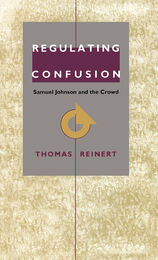
Ambivalent about the disruption, confusion, perplexity, and boundless variety apparent in the London of his day, Johnson was committed to the conventions of moral reflection but also troubled by the pressure to adopt the perspective of the crowd and the language of social theory. Regulating Confusion explores the consequences of his ambivalence and his attempt to order the chaos. It discusses his critique of moral generalizations, concept of moral reflection as a symbolic gesture, and account of what happens to the notion of character when individuals, having lost the support of moral convention, become faces in a crowd. Reflecting generally on the relationship between skepticism and political ideology, Reinert also discusses Johnson’s political skepticism and the forms of speculation and action it authorized.
Challenging prevalent psychologizing and humanistic interpretations, Regulating Confusion leaves behind the re-emergent view of Johnson as a reactionary ideologue and presents him in a theoretically sophisticated context. It offers his style of skepticism as a model of poise in the face of confusion about the nature of political truth and personal responsibility and demonstrates his value as a resource for students of culture struggling with contemporary debates about the relationship between literature and politics.
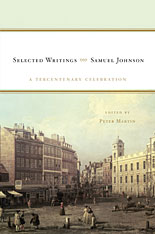
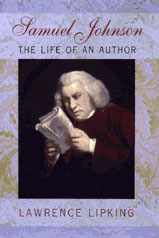
He was a servant to the public, a writer for hire. He was a hero, an author adding to the glory of his nation. But can a writer be both hack and hero? The career of Samuel Johnson, recounted here by Lawrence Lipking, proves that the two can be one. And it further proves, in its enduring interest for readers, that academic fashions today may be a bit hasty in pronouncing the "death of the author."
A book about the life of an author, about how an author is made, not born, Lipking's Samuel Johnson is the story of the man as he lived--and lives--in his work. Tracing Johnson's rocky climb from anonymity to fame, in the course of which he came to stand for both the greatness of English literature and the good sense of the common reader, the book shows how this life transformed the very nature of authorship.
Beginning with the defiant letter to Chesterfield that made Johnson a celebrity, Samuel Johnson offers fresh readings of all the writer's major works, viewed through the lens of two ongoing preoccupations: the urge to do great deeds--and the sense that bold expectations are doomed to disappointment. Johnson steers between the twin perils of ambition and despondency. Mounting a challenge to the emerging industry that glorified and capitalized on Shakespeare, he stresses instead the playwright's power to cure the illusions of everyday life. All Johnson's works reveal his extraordinary sympathy with ordinary people. In his groundbreaking Dictionary, in his poems and essays, and in The Lives of the English Poets, we see Johnson becoming the key figure in the culture of literacy that reaches from his day to our own.
READERS
Browse our collection.
PUBLISHERS
See BiblioVault's publisher services.
STUDENT SERVICES
Files for college accessibility offices.
UChicago Accessibility Resources
home | accessibility | search | about | contact us
BiblioVault ® 2001 - 2025
The University of Chicago Press









